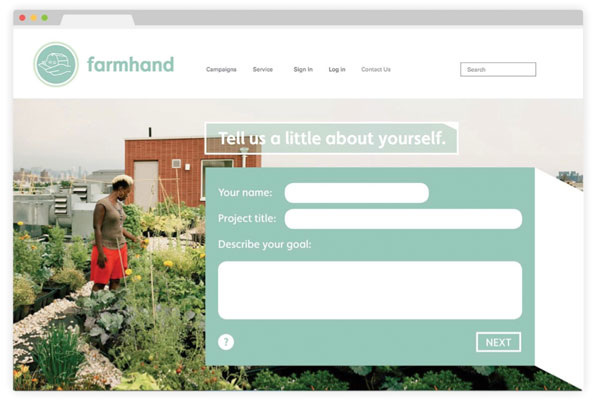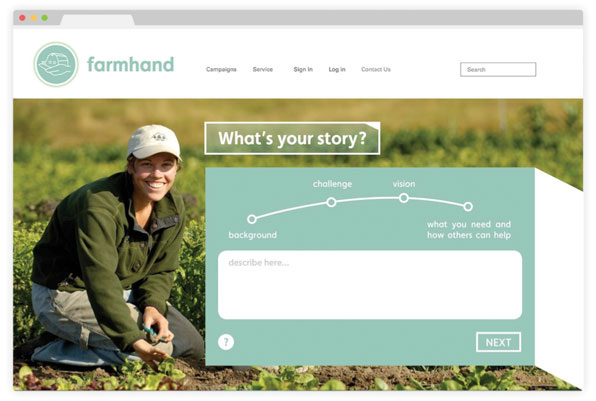Farmhand is a service that helps farmers and local food producers make their dream projects a reality. It’s a Kickstarter-meets-Good Eggs company gets food projects funded through crowdsourcing.
Farmhand is designed to make uploading projects—and supporting those projects—frictionless and easy. And one of the ways it does that is by removing the hassles of rewards. “I don’t want to have to mail a wedge of cheese to everyone who supported me,” said a dairy farmer at the Union Square Green Market, revealing that the burden of giving rewards to funders is one of the current barriers to entry for farmers interested in crowdfunding campaigns. On the supply side, research reveals that many people who support crowdfunding campaigns don’t do it for the rewards: “I wanted to support a cool cause; I don’t really need any more trinkets,” said a recent Kickstarter project supporter.
Disrupt or Support Business
The project brief for Farmhand was to create a startup that either disrupted or supported a business. We chose to disrupt Blue Apron—a service that home delivers ingredients and recipes for meal preparation.
Blue Apron adds many new layers to the food system—introducing lots of unsustainable materials, packaging, and transportation fuel to the equation—and so we instead endeavored to create a startup that connects people more directly to farmers and farmer needs.
Initial exploration exposed an opportunity to innovate around the CSA (Community Supported Agriculture) business model. Early interviews revealed that people—especially young busy people in urban environments—liked the idea of CSAs better than the actual experience of them. And since they like the idea of supporting farmers and a stronger local food system, the question became, “What’s the best way to support farmers?”
Answering that question proved to be very challenging. Farmhand went through many iterations and pivots after talking to farmers around the country via Twitter, and conducting local interviews at the Union Square Greenmarket in New York City.
Key Insights
A few key insights led to the final iteration of Farmhand. First, farmers need funding, but there is no simple, straightforward way to acquire it. (Strategies have ranged from collecting money via blog advertisements, to applying for government grants.) Second, farmers have more ideas for improving the local food system than entrepreneurs. Through surveys, we surfaced many of ideas that farmers already have for dream projects: Purchasing more land; building apiaries; switching to solar; moving to organic feed for animals; building poly-houses to extend the growth season; creating a youth entrepreneurial internship; and starting an educational children’s garden. Finally, farmers are already supporting each other’s projects through creative microfinancing.
Concept and Models
Farmhand Service
Farmhand makes it easy for farmers to support each other, and for farm lovers to support farmers. Both the web platform as well and the mobile app create the pitch by combining factual information with video, automatically stitching them together into compelling narrative.
A big challenge for the future of Farmhand has been that some farmers are wary of people who don’t understand their business and all of the risks that that business entails. That said, younger farmers tend to be more open to apps and innovation. As one interviewee at the Union Square Green Market said in response to seeing the Farmhand prototype, “This is great—especially for young farmers like my friends and I. It’s hard to get started if you don’t have land.”
The next step of this project would be to get out into the field and connect even more closely to farmers. This isn’t the kind of company that you can start from New York City.
Partners: Julia Plevin and Lance Green











